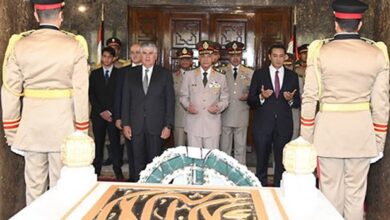40 years after his death, Nasser still rules Egypt
Forty years have elapsed since Nasser's death, but his charismatic leadership seems to have remained in the hearts of Egyptians along with the presidential route he mapped out.
Egypt's ruler still chooses his successor in utter disregard for the opinion of the people. Constitutional changes in turn ensure a repetition of the same scenario through which power is transferred.
The Nasser regime's need for stability led him to create a massive administrative body for the state–one that has lingered on until the present.
Nasser made it usual to resort to the president for solutions to all sorts of problems. Therefore the president became a central figure who makes decisions on political policy as well as the construction of a hospital or foot bridge.
Over the years, Nasser received more than 30,000 complaints from ordinary Egyptians who regarded him as their savior. When they won a match, they dedicated the victory to him, and when they fell into trouble they ran to him for help.
Sadat and Mubarak followed in Nasser’s footsteps, such that present-day Egyptians believe the president himself is the solution to their problems.
Nasser believed in centralised power, perhaps because he did not trust his aides enough. He concentrated all power in his hands and created the laws to support this orientation.
Sadat and Mubarak raised the banner of decentralization but, in effect, still retained all power.
Salah Eissa, a well-known journalist, blames the current concentration of power on the Egyptian Constitution, which vests considerable power in the presidency. The president and his powers take up two full chapters in the Constitution, he says.
The president has the absolute authority to appoint ministers and senior officials and to remove them from their positions, and so it comes as no real surprise that everyone would resort to him for help, Eissa adds.
Refaat al-Saeed, president of the Tagammu Party, says Nasser is the one to blame for individual rule in Egypt even though it’s been 40 years since his death.
Al-Saeed says Nasser is the one who propagated the notion that the president of the country is the consummate boss able to do anything.
His legitimacy was revolutionary, adds al-Saeed, whereby anybody who criticizes the leader of the revolution is deemed an enemy of the state. Al-Saeed points out that he is not attacking Nasser, but rather warning against the propagation of this model of rule.
Waheed Abdel Meguid, a political and strategic analyst, says Nasser's rule has to be viewed in its context. He posits that charismatic rule–which plays on the people's emotions–was prevalent during Nasser's era.
Hashem Amr Rabie, an expert at Al-Ahram Center for Political and Strategic Studies, says that Nasser is not alone to blame for individual rule in Egypt. Even though this type of rule was a necessity in the 1950s and 1960s, there is no reason why it should have continued after that. Any regime should only be based on constitutional legitimacy, he says.
Rabie adds that he still recalls Mubarak's speech in March 1982 when he said he would not stay in power for more than two terms–he however stayed in office for six successive terms.
But, unlike his predecessors, the current President Hosni Mubarak has not appointed a vice president during his 28-year rule.
On whether the constitutional amendments introduced by Nasser are sufficient to end individual rule in Egypt, Abdel Meguid says these reforms have not changed the core of the Constitution and are therefore unlikely to foster genuine change.
Rabie says the constitutional amendments of 2005 will, in fact, open the door to power succession and the continuing of individual rule since they have tipped the balance in favor of the executive authority.
Policy of employment in governmental apparatus
Taking power in 1971, Sadat chanted, "Abdel Nasser didn't die… We're all Abdel Nasser"–asserting that Nasser is still alive with all his thoughts and policies. Sadat allegedly followed in the steps of Nasser, especially when it came to socialism. Sadat didn't get rid of the employment policies imposed by Nasser, which opened the door for all graduates to be employed at governmental institutions, causing the administrative apparatus to further inflate.
Only 600,000 employees of 5.7 million represent the actual need; this goes back to Nasser's "social security" slogan, says Salah Gouda, director of the Economic Study Center, who adds, "employment policy can only be understood as a bribe made by the political leadership to the people, to guarantee loyalty."
"The free officers developed a different approach from what was adopted in Egypt since 1923, when liberalism was implemented across all political, economic, financial, social and cultural levels. Since 1955, the actual date that marks the end of liberal Egypt, the state has governed all social, cultural and economic levels from a political perspective, which has resulted in the nationalization of all factories," Gouda adds.
Revolutionaries announced that nationalization was in the people's favor. Wealth should go back its original owners. People of power were appointed as presidents of nationalized companies, instead of experienced ones. New presidents hired relatives and friends, until the revolution had adopted a five-year plan (from 1962-1967), according to Gouda.
Meanwhile, after the union between Egypt and Syria was disbanded in 1961, the political leadership vowed to employ all graduates of universities, institutes and even agricultural and industrial schools at governmental institutions and public sector companies, and unemployment has been known in Egypt since then, says Gouda.
Hostility to private property, a persistent Nasser legacy
Despite the state’s staunch support for the private sector, and although this sector contributes 70 percent of the Egypt’s GDP, some people still look at the businessmen class with the same skeptical eye of their past leader, Gamal Abdel Nasser, who always seemed suspicious of any sort of capital that does not fall under state control.
The persistence of such a perception might be attributed to the phenomenon of the so-called influence-wealth marriage, which increased from mere suspicion to a motivation for exchanges of accusations and lawsuits.
Before the July 1952 revolution, Egyptians, most of the time, used to look up to the rich, especially those who exhibited loyalty to their homeland and had a share in social work. Nobody, for instance, can forget the projects undertaken by Talaat Harb Pasha, the pioneer of Egypt’s modern economy, seen in the establishment of several companies, each of whom carried the name “Misr” (Egypt)–for example Bank Misr, Studio Misr, and Egypt Air.
Along with Harb, Egypt was home to several economists who the revolution considered to be symbols of a bygone era that had to be eliminated. That was triggered by one of the basic goals on which the revolution was based: to end the control of both capitalism and feudalism.
“Hold your head high, brother," “We are all equal,” and “The alliance of the people’s working forces” were all revolutionary mottoes that helped transfer this hatred of capitalist and industrialist figures to the public. This set up the public atmosphere in Egypt for the nationalization of 1961 that turned large sectors of the economy, industry, commerce, and even the field of public services over to state control.
Egypt’s economic conditions remained unchanged until the mid-seventies, when president Sadat adopted the "open door policy," which did not simply pave the way for importing, but also introduced the term “businessman” to the country, a word that was unfamiliar before the revolution. Hence, Egypt imported the term, which is believed to have evolved in Europe with the advent of factories that relied on lean manufacturing.
From these factories, a new class of economists emerged. They refused to be named as merchants, rejecting the connotation of limited capital and activity. The term “businessman” could not escape negative implications that resulted from some illegal practices, which distorted the businessman image during the open door era.
The negative Egyptian perception of the businessmen community was fueled by a number of incidents, the most famous of which was that of Tawfik Abdel Hai, who was involved in the import of defective foods. The community was also emboldened by the influence of Othman Ahmed Othman, a construction magnate and the founder of Arab Contractors Company, whose empire was described as a mini-state.
During the second half of the 1980s, people’s view of businessmen witnessed some change, thanks to a number of remarkable projects that gave a sense of a real boom in manufacturing and construction.
But, soon after Egyptians returned to their suspicious perceptions, due to some cases in which businessmen managed to combine both power and wealth. Ahmed Thabet, a professor of politics, once tackled this phenomenon in one of his writings, saying that Egypt’s political system had become a mini-state for businessmen who utilize their political influence in violating the law and achieving personal and economic benefits. He cited the long delay in passing the anti-monopoly law as evidence, arguing that even after it was enacted, the law appeared patchy in a way that protects those who are powerful in business.
At the present times, businessmen are not content with merely being close to the authorities, but moreover vie for parliamentary, partisan seats, ministerial posts, and even struggle to have it both ways.
Today, we have businessmen who occupy parliamentary seats besides running their own businesses. The most vivid example is Ahmed Ezz, the steel magnate who is also the head of the Budget and Planning Committee at the People’s Assembly. Add to this the current Minister of Housing, Ahmed al-Maghrabi, who runs several businesses in the field of tourism, and the former Transport Minister Mohamed Mansour, who has extensive economic activities.
Translated from the Arabic Edition.




